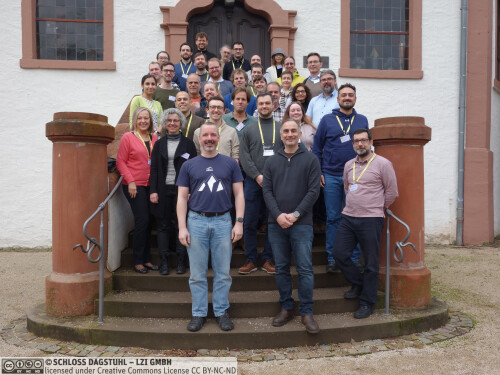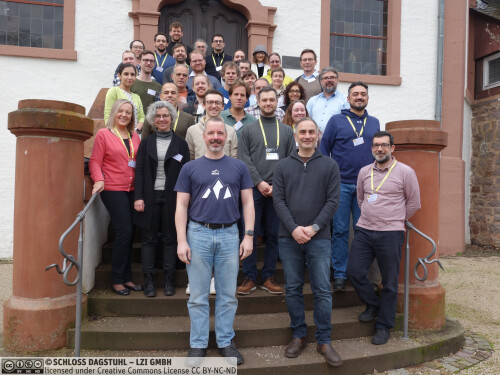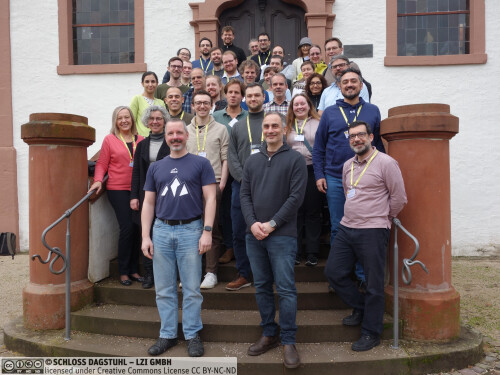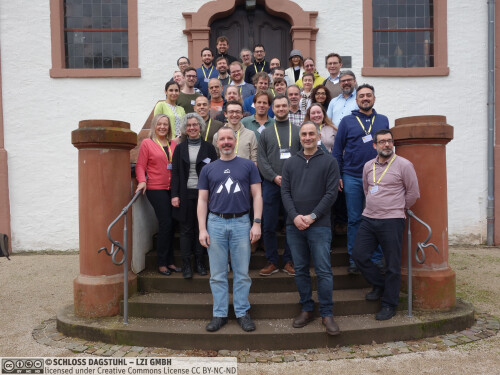Dagstuhl-Seminar 24051
Next Generation Protocols for Heterogeneous Systems
( 28. Jan – 02. Feb, 2024 )
Permalink
Organisatoren
- Stephanie Balzer (Carnegie Mellon University - Pittsburgh, US)
- Marco Carbone (IT University of Copenhagen, DK)
- Roland Kuhn (Actyx AG - Kassel, DE)
- Peter Thiemann (Universität Freiburg, DE)
Kontakt
- Andreas Dolzmann (für wissenschaftliche Fragen)
- Christina Schwarz (für administrative Fragen)
Impacts
- Behavioural Types for Heterogeneous Systems : Position Paper - Fowler, Simon; Haller, Philipp; Kuhn, Roland; Lindley, Sam; Scalas, Alceste; Vasconcelos, Vasco T. - Cornell University : arXiv.org, 2024. - 12 pp..
- Split Decisions : Explicit Contexts for Substructural Languages : article in CPP '25: Proceedings of the 14th ACM SIGPLAN International Conference on Certified Programs and Proofs - Zackon, Daniel; Sano, Chuta; Momigliano, Alberto; Pientka, Brigitte - New York : ACM, 2025. - Pages 257 - 27.
- The Concurrent Calculi Formalisation Benchmark - Carbone, Marco; Castro-Perez, David; Ferreira, Francisco; Gheri, Lorenzo; Jacobsen, Frederik Krogsdal; Momigliano, Alberto; Padovani, Luca; Scalas, Alceste; Tirore, Dawit; Vassor, Martin; Yoshida, Nobuko; Zackon, Daniel - Heidelberg : Springer, 2024. - 330 S. - (Lecture notes in computer science ; 14676 : article).
Programm
Initial preparations
Based on the ideas of our seminar proposal, we established four key general areas: quantitative systems, verification, mechanisation, and security. We assigned each area to a day of the week (from Monday to Thursday) and asked an invitee representative of the area to give an introductory talk. Then, each of these talks was followed by other talks and breakout rooms related to the area. Breakout rooms were established during the seminar based on discussions with the rest of the participants. As a result of this, the first part of the week consisted primarily of talks, while the second part included more time for breakout sessions.
Activities and outcome
Throughout the seminar, the participants gathered in focused breakout groups: the findings of the breakout groups are described in more detail in the last part of the report. The participants of several breakout groups have agreed to continue their work and collaboration after the seminar.
In addition to these more structured breakout sessions there were further lively improvised meetings and discussions (especially after dinner) which are not summarised in the report.
Overall, we believe that the seminar activities were a success. At the end of the seminar the participants agreed to remain in contact to continue the discussions, and foster new collaborations. There was strong enthusiasm for organising a follow-up Dagstuhl Seminar in the future, perhaps taking place in about 1-2 years time. One concrete outcome was the submission of a position paper (cf. the working group "Typing Across Heterogeneous Components") that has been accepted and presented at PLACES 2024 (co-located with ETAPS).
 Stephanie Balzer, Marco Carbone, Roland Kuhn, and Peter Thiemann
Stephanie Balzer, Marco Carbone, Roland Kuhn, and Peter Thiemann
The emergence of new computing systems, like cloud computing, blockchains, and Internet of Things (IoT), replaces the traditional monolithic software hardware stack with a distributed heterogeneous model. This change poses new demands on the programming languages for developing such systems: compositionality, allowing decomposition of a system into smaller, possibly heterogeneous parts and composition of the individually verified parts into a verified whole; security, asserting end-to-end integrity and confidentiality; quantitative reasoning methods, accounting for timing and probabilistic events; and, as a cross-cutting concern, certification of asserted properties in terms of independently verifiable, machine-checked proofs.
Characteristics of this emerging computation model are distribution of the participating entities and message passing as the primary means of communication. Message passing is also the communication model underlying behavioral types and programming languages, making them uniquely fitted for this new application domain. Behavioral types explicitly capture the protocols of message exchange and have a strong theoretical foundation. Recent applications of behavioral types include smart contract languages, information flow control, and machine-checked proofs of safety properties. Although these early explorations are promising, the current state of the art of behavioral types and programming languages lacks a comprehensive account of the above-mentioned demands.
This Dagstuhl Seminar aims to gather experts from academia and industry to discuss the use of programming languages tailored to tackle the challenges posed by today's emerging distributed and heterogeneous computing platforms (e.g., by making use of behavioral types). It will focus on static and possibly dynamic mechanisms to support compositionality, security, quantitative reasoning, and certification.
 Stephanie Balzer, Marco Carbone, Roland Kuhn, and Peter Thiemann
Stephanie Balzer, Marco Carbone, Roland Kuhn, and Peter Thiemann
- Amal Ahmed (Northeastern University - Boston, US) [dblp]
- Aslan Askarov (Aarhus University, DK) [dblp]
- Stephanie Balzer (Carnegie Mellon University - Pittsburgh, US) [dblp]
- Jesper Bengtson (IT University of Copenhagen, DK) [dblp]
- Marina Blanton (University at Buffalo, US) [dblp]
- Luis Caires (IST - Lisbon, PT) [dblp]
- Marco Carbone (IT University of Copenhagen, DK) [dblp]
- Emanuele D'Osualdo (MPI-SWS - Saarbrücken, DE) [dblp]
- Farzaneh Derakhshan (Illinois Institute of Technology - Chicago, US) [dblp]
- Christos Dimoulas (Northwestern University - Evanston, US) [dblp]
- Simon Fowler (University of Glasgow, GB) [dblp]
- Adrian Francalanza (University of Malta - Msida, MT) [dblp]
- Silvia Ghilezan (Mathematical Institute - Belgrade, RS) [dblp]
- Philipp Haller (KTH Royal Institute of Technology - Stockholm, SE) [dblp]
- Andrew Hirsch (University at Buffalo - SUNY, US)
- Raymond Hu (Queen Mary University of London, GB) [dblp]
- Ralf Jung (ETH Zürich, CH) [dblp]
- Jonas Kastberg Hinrichsen (Aarhus University, DK)
- Robbert Krebbers (Radboud University Nijmegen, NL) [dblp]
- Roland Kuhn (Actyx AG - Kassel, DE) [dblp]
- Sam Lindley (University of Edinburgh, GB) [dblp]
- Marco Peressotti (University of Southern Denmark - Odense, DK) [dblp]
- Jorge Pérez (University of Groningen, NL) [dblp]
- Kirstin Peters (Universität Augsburg, DE)
- Brigitte Pientka (McGill University - Montréal, CA) [dblp]
- António Ravara (NOVA University of Lisbon, PT) [dblp]
- Alceste Scalas (Technical University of Denmark - Lyngby, DK) [dblp]
- Felix Stutz (University of Luxembourg, LU)
- Peter Thiemann (Universität Freiburg, DE) [dblp]
- Emilio Tuosto (Gran Sasso Science Institute - L'Aquila, IT) [dblp]
- Vasco T. Vasconcelos (University of Lisbon, PT) [dblp]
- Malte Viering (SAP SE - Walldorf, DE)
- Andrew Wagner (Northeastern University - Boston, US)
- Nobuko Yoshida (University of Oxford, GB) [dblp]
- Lukasz Ziarek (University at Buffalo, US) [dblp]
Verwandte Seminare
- Dagstuhl-Seminar 17051: Theory and Applications of Behavioural Types (2017-01-29 - 2017-02-03) (Details)
- Dagstuhl-Seminar 21372: Behavioural Types: Bridging Theory and Practice (2021-09-12 - 2021-09-17) (Details)
- Dagstuhl-Seminar 26071: Behavioural Types for Resilience (2026-02-08 - 2026-02-13) (Details)
Klassifikation
- Programming Languages
Schlagworte
- behavioral types
- session types
- communication
- concurrency
- distribution





 Creative Commons BY 4.0
Creative Commons BY 4.0
